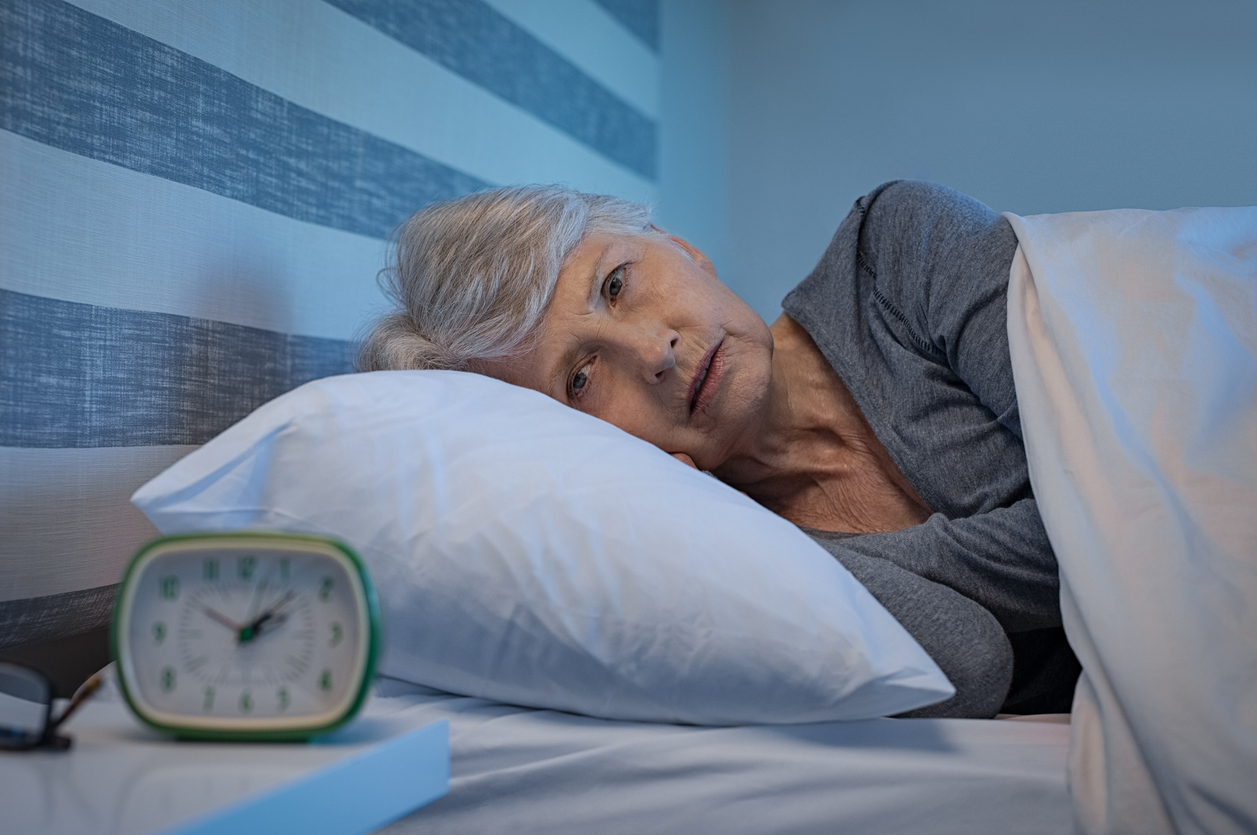Insomnia is a common sleep disorder characterized by difficulty falling asleep, staying asleep, or waking up too early and being unable to go back to sleep. While insomnia can affect people of all ages, it is particularly prevalent among older adults, impacting their quality of life, overall health, and well-being. Understanding the causes, risks, and potential solutions for insomnia in the elderly is crucial for improving their sleep and, ultimately, their quality of life.
Prevalence of Insomnia in the Elderly
Research shows that insomnia affects up to 50% of people aged 65 and older. Aging brings about changes in sleep patterns and rhythms, which can contribute to insomnia. As we age, sleep becomes lighter, shorter, and more fragmented, which increases the likelihood of sleep disturbances. Additionally, older adults may experience a shift in their circadian rhythm, causing them to feel sleepy earlier in the evening and wake up earlier in the morning.
Causes of Insomnia in the Elderly
- Physical Health Issues: Chronic medical conditions such as arthritis, heart disease, respiratory issues, and gastroesophageal reflux disease (GERD) can cause discomfort, pain, or breathing difficulties, leading to sleep disruptions. Older adults are also more likely to experience nocturia (the need to urinate frequently during the night), which can interrupt sleep.
- Medications: Many older adults take medications for various health conditions, some of which can have side effects that interfere with sleep. For example, certain antidepressants, beta-blockers, and diuretics can contribute to insomnia.
- Mental Health Conditions: Anxiety, depression, and cognitive decline, including dementia, are more common in older adults and are strongly associated with insomnia. Worry and stress can make it difficult to relax and fall asleep, while depression may lead to early morning awakenings.
- Sleep Disorders: Sleep apnea, restless legs syndrome (RLS), and periodic limb movement disorder (PLMD) are common in older adults and can severely disrupt sleep. Sleep apnea, in particular, causes breathing to stop and start during the night, leading to poor-quality sleep and daytime fatigue.
- Lifestyle Factors: Reduced physical activity, social isolation, and changes in daily routine can contribute to insomnia in older adults. Lack of exposure to natural light, excessive daytime napping, and an irregular sleep schedule can disrupt the body’s internal clock, making it harder to sleep at night.
- Changes in Sleep Architecture: As people age, they spend less time in deep, restorative sleep (slow-wave sleep) and more time in lighter stages of sleep. This makes them more susceptible to waking up from environmental factors such as noise or temperature changes.
Effects of Insomnia on the Elderly
Insomnia can have significant consequences for older adults, both physically and mentally. Chronic sleep deprivation has been linked to a variety of health problems, including:
- Cognitive Decline: Lack of sleep can impair memory, attention, and concentration, increasing the risk of developing dementia or other cognitive disorders.
- Increased Risk of Falls: Fatigue, dizziness, and poor balance caused by sleep deprivation can increase the likelihood of falls, which are a leading cause of injury and disability in older adults.
- Weakened Immune System: Insufficient sleep weakens the immune system, making the body more susceptible to infections and illnesses.
- Mental Health Issues: Insomnia can exacerbate feelings of loneliness, depression, and anxiety, contributing to a negative cycle of poor sleep and declining mental health.
- Cardiovascular Problems: Sleep deprivation is linked to an increased risk of high blood pressure, heart disease, and stroke in older adults.
Treatment and Management of Insomnia in the Elderly
Managing insomnia in older adults requires a comprehensive approach that addresses both the underlying causes and the symptoms of the disorder. Here are some strategies that can help:
- Sleep Hygiene: Encouraging good sleep habits is essential. This includes maintaining a regular sleep schedule, avoiding stimulants like caffeine and nicotine in the evening, limiting screen time before bed, and creating a comfortable sleep environment that is cool, dark, and quiet.
- Cognitive Behavioral Therapy for Insomnia (CBT-I): CBT-I is a highly effective, non-pharmacological treatment that focuses on changing negative thoughts and behaviors related to sleep. It helps individuals develop healthier sleep patterns and manage anxiety or stress that may be contributing to their insomnia.
- Medications: While medications are sometimes prescribed for insomnia, they should be used with caution in older adults due to potential side effects and interactions with other medications. Short-term use of sleep aids may be recommended, but long-term reliance on them is generally discouraged. Melatonin supplements may also be considered as a natural way to regulate sleep-wake cycles.
- Managing Underlying Health Conditions: Treating or managing chronic health conditions that contribute to insomnia, such as pain, breathing difficulties, or mental health disorders, is essential for improving sleep. Physicians may need to adjust medications or recommend lifestyle changes that can reduce the impact of these conditions on sleep.
- Physical Activity and Sunlight Exposure: Regular physical activity, such as walking or light stretching, can promote better sleep. Exposure to natural light during the day helps regulate the circadian rhythm, improving sleep quality at night. Spending time outdoors or near a window can be beneficial.
- Relaxation Techniques: Mindfulness, meditation, deep breathing exercises, and progressive muscle relaxation can help reduce stress and promote relaxation before bedtime.
Conclusion
Insomnia is a widespread issue among older adults, but it is not an inevitable part of aging. By understanding the causes of insomnia and implementing effective treatments and lifestyle changes, older adults can improve their sleep quality, enhancing both their physical and mental health. If insomnia persists, it is important to seek medical advice to identify any underlying health issues and develop a personalized treatment plan. Improving sleep is key to enhancing the overall well-being and quality of life for older adults.
If you or someone you know is interested in care management or home healthcare services in South Florida, FirstLantic can help. We are locally owned and operated, providing our patients with the highest quality in-home care services in Fort Lauderdale (Broward County), as well as in-home care services in Delray Beach (Palm Beach County), North Miami (Miami-Dade) and Jupiter (Treasure Coast) since 2000. Click here to contact us.
 AVAILABLE 24 HOURS A DAY/7 DAYS A WEEK
AVAILABLE 24 HOURS A DAY/7 DAYS A WEEK Careers
Careers




